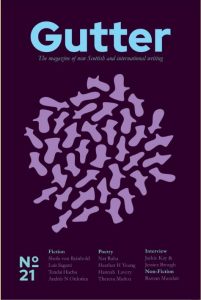Gutter No.21
 The sober aubergine cover of the latest issue of Gutter is distinct from the magazine’s customary vibrant jackets. In collaboration with guest editors Alycia Pirmohamed and Jay G Ying, Gutter makes a stand against tokenisation in this celebration of Black Asian and Minority Ethnic writers from Scotland and across the world.
The sober aubergine cover of the latest issue of Gutter is distinct from the magazine’s customary vibrant jackets. In collaboration with guest editors Alycia Pirmohamed and Jay G Ying, Gutter makes a stand against tokenisation in this celebration of Black Asian and Minority Ethnic writers from Scotland and across the world.
Exploring the multi-faceted aspects of identity, the twin concerns of oppression and self-determination run through the collection raising the flag for what it means to be true to oneself. In Jakky Bankong-Obi’s inaugural poem ‘Nostalgia in Vibe’, nine couplets occupy the page like the garrisons of Nigeria’s military regime. The sense of oppression in the ‘Barracks quarters’ corridor’ is diminished by the juxtaposed rhythmic Afrobeat:
African Woman go dance…
She go dance fire dance,’ Fela invokes [.]
As the speaker’s ‘mother/joins the chorus of swaying hips’, the rhythm shimmies along the lines to the allegory of the final stanza:
Movement echoes of a history written in tribal drumming. It was in my
mothers kitchen I learned that in melanin everything is a vibe.
We are roused by this communal celebration of roots and nurturing, but how does one define oneself in a culture where sexual expression and freedom of thought are criminal offences? Vivid imagery and cultural symbolism in Esraa Husain’s ‘Home, Home’ evokes a sense of acceptance and safety in a dream of ‘A house for a Kuwaiti family’. The pathos is sharp as the narrator, alone and isolated in a cold flat in Aberdeen, dreams of a ‘civilised’ home where repression is the nightmare and acceptance, the reality.
But what of Ibrahim, the queer refugee in Andrés N Ordorica’s ‘The Urchin?’ A fitting metaphor for a traumatised boy, displaced in Aberdeen with a mother stuck in the past. He has ‘learned to see the beauty in greyness’ in a ‘dreich’ city, in this uplifting tale of overcoming trauma, integration, sexual awakening and self-discovery. Ibrahim knows ‘if he were home […] they’d kill him in the streets’ but:
Ibrahim was able to find himself and that was the greatest thing that could have happened in such painful circumstances. From darkness, he found his light.
Though the home is a place of safety for some, it can stifle any sense of the self as we see in Neelim Dundas’s ‘Weatherbeaten’. A melancholic tale where the internal is externalised, the protagonist yearns for human contact after losing the one thing she has left that defines her: a simple walk to the canal. Her life is a monotony of torrential rain and caring for a husband with dementia who ‘only sees her in his direct line of sight’.
The titular refrain in Toni Velikova’s ‘There’s always something’ is like a flashback of the rape it depicts. This fracturing of the self, centres on victim blaming in a harrowing read, yet it did not prepare me for the trauma of Julie Rea’s ‘Gethsemane’. The biblical allusion of the title reflects the suffering of two young girls in this brutally honest tale of acting out amidst the cycle of childhood sexual abuse.
Julie Laing’s concrete poem, ‘Overspill’ addresses the splintered communities of Glasgow’s slum clearances. Two stanzas stacked like slums are connected by the stench and comical ‘writing on the wall’ of the A804 underpass. During a forced ‘flitting’ the sense of isolation is beautifully rendered:
Marie chases us along the
street waving and we
sail away faster than she runs […]Mum is waving over the fence […]
She doesn’t know a word
for how she feels.The field rustles behind her.
Sunset draws the hills close
enough to almost touch.
Gutter 21’s inclusive collection moves to disperse discriminatory assumptions that perpetuate racial stereotyping in Scotland’s literary scene, delivering a truly multicultural experience. The varied concerns and the polyphonic multiplicity of BAME voices are “championed” in explorations of identity that go beyond skin colour showing that BAME is not a homogenous category but one made up of unique individuals and groups—and highlighting the need to nuance it.

Leave a Reply